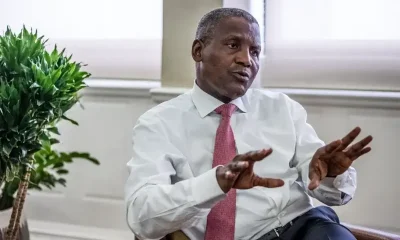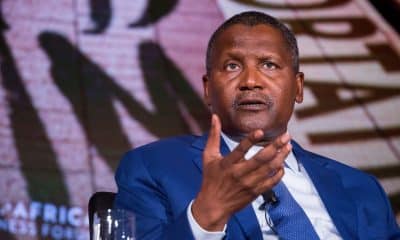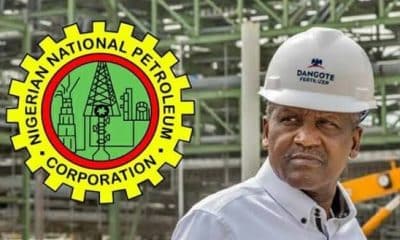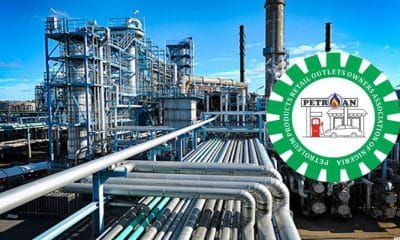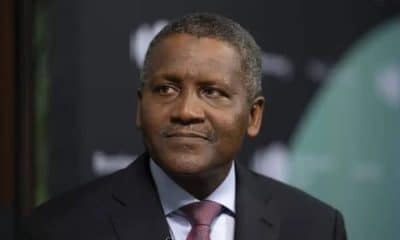Business
Dangote Refinery’s Fuel Supply Unlikely To Lower Prices – Experts, Marketers

As the Dangote Refinery gears up to start supplying Premium Motor Spirit (PMS), also known as petrol, to the Nigerian market, industry experts and marketers assert that it won’t lead to a significant drop in fuel prices.
Recently, Aliko Dangote, the Chairman of the Lagos-based refinery, announced a delay in the commencement of fuel supply, shifting the date to mid-July 2024 from the initially projected June. Dangote attributed this postponement to minor delays.
While the refinery began supplying diesel and aviation fuel in April, it has faced ongoing challenges in securing crude oil for petrol production since its commissioning on May 23 of the previous year.
Dangote has accused cartels within the oil and gas sector of sabotaging the refinery’s efforts to commence full-scale operations.
Speaking at the Afreximbank Annual Meetings in the Bahamas and in an interview with CNN, he alleged that powerful groups are working against his company.
Naija News reports that Vice President of Dangote Industries Limited, Devakumar Edwin, recently accused International Oil Companies (IOCs) in Nigeria of obstructing the refinery by refusing to sell crude oil at market prices, instead charging a premium of $6 above market rates.
As a result, Dangote Refinery has resorted to importing crude oil from the US despite Nigeria’s abundant natural reserves.
On June 9, 2024, the Lagos State Chamber of Commerce and Industry attributed the inadequate crude supply to oil theft and pipeline vandalism.
Meanwhile, the Nigerian Upstream Petroleum Regulatory Commission (NUPRC) assured that IOCs would supply crude oil to Dangote Refinery, yet the refinery claims that the issue persists.
This ongoing challenge raises doubts about the mid-July start date for petrol supply. Amid these issues, many Nigerians are concerned about whether domestic fuel production will lower prices, but stakeholders believe this is unlikely.
Following the removal of fuel subsidies last year, petrol prices surged to an average of ₦769.62 per liter in May 2024, up from ₦238 in the previous year.
This increase, along with other policies from President Bola Ahmed Tinubu’s administration, has driven inflation to 33.95% for headline rates and 40.66% for food prices, exacerbating economic hardship.
In an interview with DAILY POST, President of the Petroleum Products Retail Outlets Owners Association (PETROAN), Billy Gillis-Harry, stated that the entry of Dangote Refinery’s fuel into the market will not significantly lower prices.
He noted that despite initial hopes, the price of diesel did not drop with the refinery’s entry into the market, selling instead at ₦1403.96.
Gillis-Harry emphasized that as long as Dangote Refinery imports crude oil, its petrol prices are likely to remain high.
He explained that the need to secure foreign exchange to import crude and then sell the refined product in Naira would prevent a significant price drop.
He doubted that Dangote’s petrol would benefit from any government subsidies, which have been a factor in maintaining current prices.
Gillis-Harry also expressed skepticism about the full-scale operation of the Port Harcourt, Kaduna, and Warri refineries, citing repeated delays and a lack of confidence in their timely commencement.
Discussing the potential exit of the Nigerian National Petroleum Corporation Limited (NNPCL) from the fuel supply market upon Dangote Refinery’s entry, he noted that Dangote, as a businessman, is likely seeking to capitalize on market opportunities, which might include expecting NNPCL to cease fuel imports.
Meanwhile, Managing Partner of BBH Consulting, Barr. Ameh Madaki, criticized the current management of Nigeria’s oil sector, highlighting that high energy costs are stifling the economy. He suggested that Dangote Refinery has the capacity to lower prices for petroleum products if it chooses to do so.
Prof. Wumi Iledare, Executive Director of the Emmanuel Egbogah Foundation, attributed the challenges in the oil and gas sector to poor decision-making and a lack of comprehensive understanding by policymakers.
He emphasized that only transformative ideas and policies can lead to sustainable national development, cautioning against relying on transactional decisions for long-term progress.

